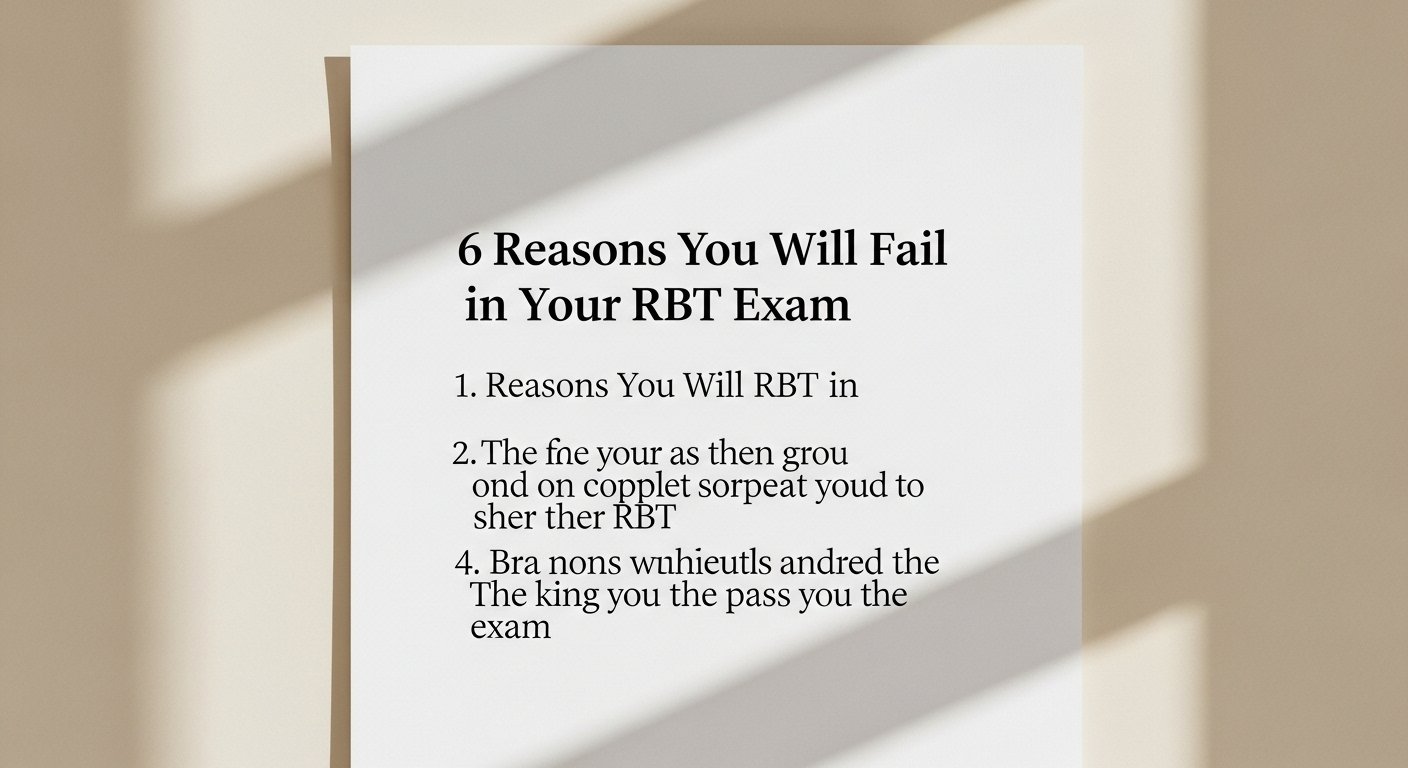Being the Certified Behavior Technician (RBT) will be an exciting goal for anyone seeking a job within applied behavioral analysis (ABA). However, the road to certification may not be effortless. While passing the RBT exam is an impressive success for a lot of people, some applicants fail to pass it. Understanding the causes of the failure will aid you in avoiding identical mistakes. Here are six reasons that students fail their RBT test and the best way to prepare yourself to be successful.
1. Lack of Study Focus
One of the main reason why students fail the RBT test is a lack of a focused learning. This RBT examination covers a vast variety of topics in the area of ABA that include assessments of behavior, strategies for teaching ethical considerations, and the collection of data. Without a clearly defined study plan it is difficult to be overwhelmed and forget the most important concepts.
To prevent this from happening, make an outline of your study plan that breaks the subject into smaller chunks that are manageable. Concentrate on learning each topic fully before moving onto the next. Utilize study guides and practice tests to help you build your knowledge.
2. Inadequate Practical Experience
The RBT test is not just about theoretical knowledge, but as well the application of this knowledge in real-world scenarios. If you don’t have enough practical knowledge of ABA It can be difficult to answer questions based on scenarios efficiently. Experience in the field is crucial to understanding how concepts such as reinforcement, behavior reduction and learning skills translate into real-world behavior changes.
Before you sit for the test make sure that you have acquired practical experience engaging with your clients as well as implementing ABA techniques under the supervision of a professional. This practical experience will make you feel more at ease when you answer the questions that require application on the test.
3. Poor Test-Taking Strategies
Many applicants fail on the RBT exam because they lack appropriate test-taking techniques. Controlling time, understanding how to tackle multiple-choice tests and being able identify incorrect answers are essential abilities. If you don’t have these skills you may be unable to finish your work or forget questions that you could easily have asked.
To increase your ability to take tests try practicing by taking timed tests and create a plan of answering questions. Concentrate on studying the questions thoroughly and weeding out any obvious mistakes. If you’re uncertain about a question then move on to the next question and come back on it in the future.
4. Not Understanding the Exam Format
The RBT test is comprised of 75 multiple-choice tests, and understanding the structure that the tests follow is crucial to be successful. If you’re not familiar with the way the questions are formulated or the subjects that are given priority and how to answer them, you could waste your time with questions that don’t matter as much. A lack of knowledge can cause unnecessary anxiety and confusion.
Make sure you learn about the test’s structure. Examine the tasks list that is that is provided by the Behavior Analyst Certification Board (BACB) and be aware of what topics you will cover. If you are familiar with the format, you’ll be able to more effectively manage your time and stay focused on the most important issues.
5. Neglecting to Review Ethical Guidelines
Ethics are an important aspect of the RBT test. A lot of candidates fail due to ignoring the significance of the section on ethics. The BACB has strict guidelines for ethical conduct that RBTs have to follow Failure to comprehend these guidelines could result in failing the test.
It is important to read the ethical guidelines set forth by the BACB Pay particular focus on confidentiality of clients’ professional boundaries, confidentiality, and consent. The ethical behavior of a person is not just important for passing the exam but is also crucial to your everyday training as an RBT.
6. Underestimating the Importance of Consistent Preparation
Additionally, a large number of applicants fail in the RBT test because they don’t realize the necessity of a regular and long-term planning. Doing a grueling practice session the night before the test might seem like an appealing option, but it’s not a good idea over the long term. ABA concepts and techniques require a deep understanding and a lot of training, which cannot be accomplished in a short amount of time.
Note: I came across RBT Exam Guide website. They have RBT Practice Exam 75 questions, which is recommended for you to take in order to have a good understanding. They also have a complete guide about registered behavior technician exam guide.
Instead of trying to memorize everything do your best to stick to regular study routines over a period of months or weeks leading up to the exam. Regular study sessions can aid in relearning important concepts and provide you with time to go over areas where you’re struggling. It is recommended to spread out your study time. It has been proven to increase retention and comprehension.
Conclusion
The RBT test is a difficult one however, with proper training, it’s attainable. Beware of the most common mistakes that were mentioned earlier–like inattention, lack of knowledge of the test, or failing to study ethical guidelines will set you on the right path towards success. Through establishing a study plan and gaining practical experience and mastering the techniques for taking tests and taking the necessary time to study for the exam, you will improve your chance in passing your RBT test and becoming a professional certified in the area of ABA. Have fun!
